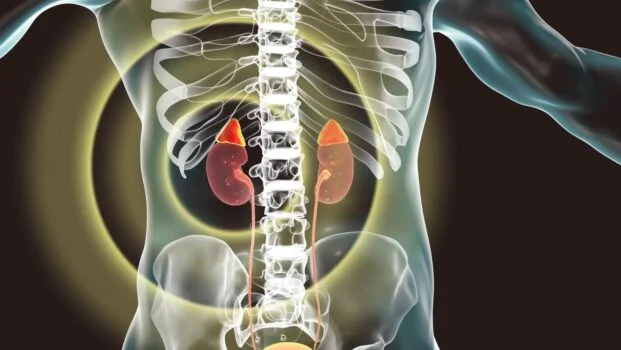Almost all of us deal with stress every day, and it’s become a part of our everyday lives. However, prolonged or excessive stress can have detrimental effects on the body, particularly on the intricate system known as the (HPA) hypothalamic-pituitary-adrenal axis. Under normal circumstances, the HPA axis efficiently regulates the body’s stress response, maintaining hormonal balance and resilience.
It can disrupt your overall well-being, but the good news is that there are natural ways to reverse this condition and restore your energy levels and vitality. Acute stress triggers a short-term, adaptive response from the HPA axis, which is different from the long-term effects of chronic stress that impair hormone regulation.
Here, we explore the causes, symptoms, treatment options, and strategies for managing stress to promote optimal health in HPA axis dysfunction.

What is the HPA Axis?
The HPA axis, short for the hypothalamic-pituitary-adrenal axis, is a vital system in the body responsible for regulating the body’s response to stress. The HPA axis works in conjunction with the central nervous system to regulate stress and maintain homeostasis.
It involves a complex interplay between the hypothalamus, pituitary gland, and adrenal glands. Early life experiences, such as prenatal stress, can permanently affect the HPA axis and stress response in adulthood.
The HPA axis comprises three main components:
- Hypothalamus: Located in the brain, the hypothalamus releases corticotropin-releasing hormone (CRH) in response to stress.
- Pituitary Gland: Situated at the base of the brain, the pituitary gland secretes adrenocorticotropic hormone (ACTH) when stimulated by CRH.
- Adrenal Glands: Found atop the kidneys, the adrenal glands produce cortisol, often referred to as the “stress hormone,” in response to ACTH. The HPA axis response involves a cascade of hormonal signals that help the body adapt to stress.
What is HPA Axis Dysfunction?
HPA axis dysfunction, also known as HPA dysfunction, occurs when this intricate system becomes dysregulated, leading to imbalances in hormone levels and an exaggerated stress response.
Chronic stress leads to dysregulation of the HPA axis, further contributing to these imbalances. Lifestyle changes and nutrient support can help restore healthy levels of stress hormones, improving mood, metabolism, and overall hormonal harmony.
Several factors can contribute to dysfunction, including chronic stress, trauma, illness, or genetic predisposition.
Trauma, illness, or genetic predisposition can also impact HPA axis function, disrupting the communication pathways involved in regulating stress response and hormonal balance.
What Causes HPA Axis Dysfunction?
1. Chronic Stress and Lifestyle Factors:
One of the primary causes of HPA axis dysfunction is chronic stress. It is important to distinguish between acute stress, which is short-term, and chronic stressors, which are ongoing or prolonged stress conditions that continuously activate the HPA axis and impair its ability to regulate hormone production. Magnesium deficiency increases anxiety and HPA-D onset by amplifying the transcription of CRH.
Whether it’s from work, relationships, or other sources, prolonged stress can put a significant strain on the adrenal glands, leading to dysfunction over time. Environmental stress, such as exposure to toxins or noise, can also contribute to HPA axis dysfunction.
Additionally, emotional stress, including unresolved emotional issues or trauma, is a key factor that can disrupt the HPA axis. These factors can create a vicious cycle, where stress and HPA axis dysfunction reinforce each other and make recovery more challenging.
2. Poor diet and nutrition:
A diet high in processed foods, sugar, and caffeine can also contribute to HPA axis dysfunction. Poor dietary choices can lead to blood sugar dysregulation, which negatively affects HPA axis function and can worsen stress-related symptoms.
These substances can disrupt hormone balance and put additional stress on the adrenal glands. It is possible to support HPA axis dysfunction by switching to a balanced diet rich in whole foods.
Maintaining stable blood sugar through nutrient-dense carbohydrates and adequate protein intake is important for optimal HPA axis health. Licorice root contains compounds that support adrenal function and cortisol regulation.
3. Lack of sleep:
Sleep is crucial for HPA axis dysfunction, as it allows the body to rest and repair itself. The circadian rhythm regulates hormone production, including cortisol, and disruptions to this rhythm can impair HPA axis function.
Chronic sleep deprivation can impair adrenal function and exacerbate symptoms of fatigue. Maintaining good sleep hygiene and ensuring consistent, restorative sleep is crucial for restoring circadian rhythms and adrenal recovery.
Establishing a regular sleep schedule, creating a sleep-friendly environment, and adopting strategies to enhance sleep quality can promote better sleep quality. The cortisol awakening response is an important marker of HPA axis activity and can be affected by sleep patterns.
- Consulting a Healthcare Professional: If experiencing symptoms of HPA axis dysfunction, it’s essential to consult a healthcare provider for proper evaluation and guidance.
- Testing methods: While there’s no definitive test for HPA axis dysfunction, healthcare providers may use various methods to assess adrenal function, such as saliva or blood tests to measure cortisol levels throughout the day.
- Symptoms assessment: In addition to laboratory tests, healthcare providers will also evaluate symptoms and medical history to diagnose HPA axis dysfunction accurately.
- Treatment Options: Treatment may involve lifestyle modifications, dietary changes, stress management techniques, and, in severe cases, hormone replacement therapy under medical supervision.
Read our client testimonials. Get to know more in detail with well-known healthcare expert Shawn Phillips!

Symptoms of HPA Axis Dysfunction
1. Fatigue and Low Energy Levels:
HPA axis dysfunction causes persistent tiredness, even after rest, impacting daily tasks and quality of life. Individuals feel exhausted throughout the day, unable to muster energy, despite adequate sleep.
This fatigue can be overwhelming, leading to frustration and helplessness. Some individuals may experience elevated evening cortisol, which can further disrupt sleep and worsen fatigue.
2. Mood Swings and Irritability:
HPA axis dysfunction results in frequent mood swings, irritability, and difficulty coping with stress. Chronic inflammation can contribute to mood disturbances in HPA axis dysfunction. Individuals experience sudden shifts in mood, from intense agitation to sadness. Mood swings strain relationships and hinder daily functioning.
3. Digestive Issues:
It disrupts digestion, leading to symptoms like bloating, discomfort, constipation, or diarrhea. These issues are distressing and impact overall well-being. Chronic problems can affect nutrient absorption, worsening fatigue. Additionally, hyponatremia is a potential consequence of prolonged elevated cortisol levels, further complicating the condition.
4. Weight Gain:
HPA axis dysfunction causes unexplained weight gain, especially around the abdomen. Increased visceral fat leads to a protruding belly and raises the risk of metabolic disorders. Hormonal imbalances disrupt appetite regulation and promote fat storage, contributing to weight gain.
Cognitive symptoms such as brain fog and memory problems are also common. Reduced levels of brain derived neurotrophic factor may contribute to cognitive difficulties in HPA axis dysfunction. Additionally, post traumatic stress disorder is associated with altered HPA axis function and can present with similar symptoms.
If you’re looking for HPA axis dysfunction treatment naturally, you can trust Shawn Phillips, a top healthcare professional based in Los Angeles. With a holistic approach encompassing personal training, mental health coaching, and nutrition coaching, Shawn offers both in-home personal training as well as online health coaching services customized to individual needs.
His expertise in holistic wellness makes him an ideal partner on the journey to reclaiming energy and vitality. By implementing natural remedies and lifestyle changes under Shawn’s guidance, you can address HPA axis dysfunction effectively and regain balance in your life.

The Impact of HPA Axis Dysfunction on the Nervous System
HPA axis dysfunction can significantly affect the nervous system, leading to a wide range of cognitive, emotional, and behavioral symptoms.
When the body is exposed to chronic stress, the delicate balance of the hypothalamic-pituitary-adrenal (HPA) axis is disrupted, which can alter the structure and function of key brain regions involved in the stress response, such as the hypothalamus and amygdala.
This disruption often results in changes to stress responses, including increased or erratic cortisol production and fluctuating cortisol levels, which further contribute to HPA axis dysregulation.
The adrenal glands, a crucial part of the HPA axis, are responsible for producing stress hormones like cortisol. When these glands become overworked due to ongoing stress—sometimes referred to as adrenal fatigue—adrenal function can decline, leading to imbalances in hormone levels.
This can manifest as persistent fatigue, brain fog, and mood disturbances, all of which are signs that the nervous system is under strain.
HPA axis dysfunction also impacts the autonomic nervous system, which controls involuntary bodily functions such as heart rate, blood pressure, and digestion. Chronic stress can cause the sympathetic nervous system to become overactive, resulting in symptoms like anxiety, insomnia, and poor stress tolerance.
At the same time, the parasympathetic nervous system, which is responsible for relaxation and recovery, may become less effective, making it harder for the body to unwind and recover from daily stressors.
Beyond the nervous system, HPA axis dysregulation can contribute to a host of chronic health conditions. Elevated cortisol levels and ongoing stress can impair immune function, increase inflammation, and raise the risk of autoimmune disease and psychiatric disorders. Omega-3 fatty acids are essential for HPA axis function and help alleviate inflammation and stress response.
Additionally, HPA axis dysfunction can disrupt blood sugar regulation, leading to elevated blood sugar, insulin resistance, and metabolic imbalances that make it harder to lose weight and maintain overall health. High-quality sea salt contributes to electrolyte balance and supports adrenal health.
Supporting healthy HPA axis function is essential for protecting the nervous system and promoting overall well-being. Natural strategies such as practicing meditation, yoga, and deep breathing exercises can help regulate stress responses and support adrenal health.
Consuming a nutrient-rich diet that includes vitamin C, B vitamins, and antioxidant-rich foods can help reduce oxidative stress and support adrenal hormone production. Prioritizing quality sleep, engaging in regular physical activity, and maintaining a balanced lifestyle are also key to restoring HPA axis regulation and reducing the risk of chronic health conditions.
By understanding how HPA axis dysfunction impacts the nervous system and taking proactive steps to support adrenal function, individuals can improve cognitive function, stabilize mood, and enhance their body’s resilience to stress. This holistic approach not only benefits the nervous system but also supports long-term health and vitality.

HPA Axis Dysfunction Diet
1. Balanced Diet with Whole Foods:
Prioritize nutrient-dense whole foods, including fruits, vegetables, lean proteins, and healthy fats, to support adrenal health.
2. Limiting Caffeine and Sugar:
Reduce or eliminate caffeine and sugar intake, as these substances can further stress the adrenal glands and disrupt hormone levels. Fermented foods are rich in probiotics that can benefit HPA axis function through the gut-brain axis.
3. Incorporating Adaptogenic Herbs:
Herbs like ashwagandha, rhodiola, and holy basil have adaptogenic properties that help the body adapt to stress and support adrenal function. Certain adaptogens, such as holy basil, can also help reduce HPA axis hyperactivity, thereby supporting the body’s stress response. Rhodiola can support mental clarity and resilience by regulating neurotransmitter levels in the brain.
Related Articles:
Lifestyle Modifications for HPA Axis Dysfunction
1. Stress Management Techniques:
Practice relaxation techniques such as deep breathing, meditation, or mindfulness to reduce stress levels and support adrenal recovery.
2. Prioritizing Sleep:
Establish a consistent sleep schedule and create a relaxing bedtime routine to promote restful sleep and optimize adrenal function.
3. Regular Exercise:
Engage in regular physical activity, such as walking, yoga, or strength training, to improve mood, reduce stress, and support overall well-being.

Exercise and Physical Activity
- Yoga and Meditation: Practicing yoga and meditation not only promotes relaxation but also helps reduce cortisol levels and improve adrenal function.
- Aerobic Exercise: Engaging in regular aerobic exercise, such as walking, jogging, or cycling, boosts mood, energy, and overall well-being.
Managing HPA axis dysfunction naturally requires a holistic approach that addresses underlying causes, supports adrenal health through dietary and lifestyle changes, and prioritizes stress management and self-care practices.
By implementing these strategies, individuals can restore balance to their body’s systems and reclaim their vitality and well-being.

